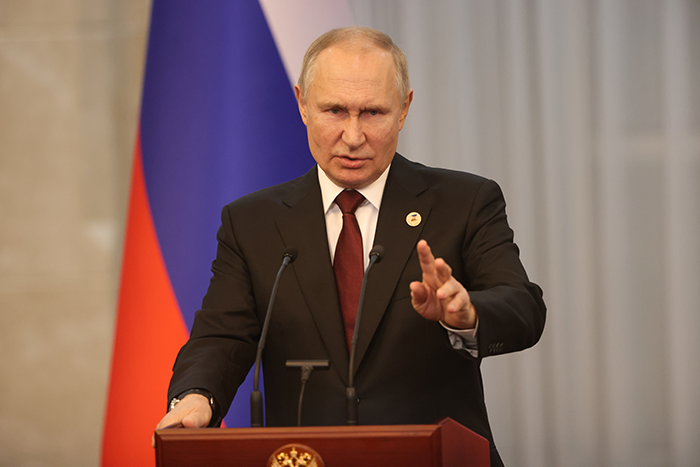Interviews
4 February 2025
Trump, Syria, Lukashenko: What Strategy for Russia?

Entangled in a war with its Ukrainian neighbor that it initiated three years ago, Russia has been facing major geopolitical upheavals since the end of 2024. In the United States, Donald Trump’s return to power is reshaping the contours of American support for Kyiv, though the direction remains uncertain. In the Middle East, the unexpected fall of Bashar al-Assad deprives Moscow of a long-standing partner and calls into question its direct access to the Mediterranean via the Tartus base. However, the continued rule of Alexander Lukashenko in Belarus appears to provide some degree of continuity during this period of instability, though its long-term impact remains to be assessed. How will relations between Moscow and Washington evolve with Trump’s return? Are negotiations between Russia and Ukraine on the horizon? What will be the consequences of Assad’s downfall for Russia? And what direction is its relationship with Belarus taking? An analysis by Igor Delanoë, associate researcher at IRIS and specialist in Russian geopolitics.
What Are the Prospects for Negotiations on Ukraine Following Trump’s Return to the White House?
At this stage, Donald Trump’s return to the White House primarily changes the overall atmosphere of U.S.-Russia relations. The new American administration is no longer stating its intention to “inflict a strategic defeat” on Russia, and a special envoy for Ukraine, Keith Kellogg, has been appointed. However, the Russians remain extremely cautious regarding the statements of the new U.S. president and what actions he may take concerning the Ukrainian issue. We are currently in a phase where Russians and Americans are sizing each other up, testing each other’s reactions through political statements and media interventions.
It is essential to keep in mind that Moscow considers the ball to be in Washington’s court. Russia’s conditions for engaging in discussions are well known: they revolve around the Russo-Ukrainian draft agreement negotiated in Istanbul in March-April 2022, which was never signed but is regularly referenced by Russian authorities. Of course, the situation on the ground has evolved since then. However, the Kremlin’s key demand remains Ukraine’s neutrality, meaning a return to its non-aligned status—as stipulated in Ukraine’s constitution before Maidan—and the absence of NATO troops and certain weapons systems on Ukrainian territory.
On the Russian side, public opinion is less hawkish than the authorities. Surveys indicate that a majority of Russians would accept an immediate cessation of hostilities if it were possible. However, this cannot happen at any cost. According to the same polls, including those conducted by the Levada Center, Russians remain overwhelmingly opposed to returning Crimea or the regions annexed in September 2022, let alone allowing Ukraine to join NATO, which is widely rejected as a condition for peace. In other words, the Kremlin has little room for maneuver regarding public opinion on these issues. Meanwhile, on the Ukrainian side, surveys since the autumn show that an increasing—and now, according to some studies, majority—portion of the population is ready for an immediate ceasefire, even if it means Russian forces remain in their current positions.
Beyond Ukraine, a key issue for Russia is what comes next—specifically, the broader restructuring of security architecture in the Northern Hemisphere. Moscow’s priority remains Eastern Europe and its “near abroad,” while Washington’s focus is on the Asia-Pacific region. On this issue, both Russia and the U.S. are working to consolidate their negotiating positions, which is reflected in military deployments, the suspension of participation in international treaties, and other strategic moves. The “ideal” final state sought by Moscow is clear: it aligns with the two draft agreements it presented to the U.S. and NATO as ultimatums in December 2021—proposals that remain unacceptable to both parties in their current form.
On the Middle Eastern and Mediterranean scene, Moscow loses a valuable ally with the fall of Bashar al-Assad in Syria. What alternatives does Russia have to counter this strategic setback?
Since the fall of Bashar al-Assad, Russian bases in Syria – the only ones Moscow has outside the post-Soviet space – are at risk. Negotiations between the new Syrian authorities and the Russians have been underway since December. Last week, a high-level Russian delegation visited Syria for the first time since the collapse of Assad’s regime. Led by Vladimir Putin’s special envoy for Africa and the Middle East, and Deputy Foreign Minister Mikhail Bogdanov, it also included the special envoy for Syria, Alexander Lavrentiev, who is close to intelligence services. Despite being pragmatic, the discussions remain difficult: the Syrians are said to have demanded that the Russians hand over Bashar al-Assad, the billions of dollars he allegedly took with him when he fled, as well as compensation for the “mistakes” Russia made in Syria.
Beyond the posturing, it cannot be ruled out that Moscow will ultimately manage to retain its bases in Syria. It is now unnecessary to maintain a military contingent beyond what is needed to operate and protect these two bases. In fact, personnel and equipment have been largely evacuated in recent weeks, despite obstruction to Russian ships trying to return to Tartous. For Moscow, the main issue remains logistical: Tartous is essential to support the deployment of Russia’s naval detachment in the Mediterranean, and the Hmeimim airbase allows the projection of forces and influence toward Africa.
Moscow holds a few cards for these negotiations: recognition of the new masters of Damascus as legitimate authorities, wheat deliveries (2 million tons in 2024, making Syria the 9th market for Russian grain exports), the possibility of paying rent (which was not the case previously), and the experience gained from years of war in interfaith and interethnic negotiations… The brother of the Syrian leader, Maher al-Sharaa, recently appointed Minister of Health in the transition government, was trained and lived in Voronezh, Russia, where he speaks the language. This could also help… Finally, regionally, some countries – such as the United Arab Emirates, for example – would likely prefer that Moscow retains its bases to counterbalance Turkey, which wants the Russians to leave.
In case of failure in the talks, Russia’s fallback options are limited: Libya seems the most likely, and part of the former Russian-Syrian setup has already been transferred there. It is said that the Russian Ministry of Defense’s African Corps is set to take over an airbase in the south of the country, in addition to those already leased to Haftar. For its navy, Russia could seek to obtain facilities in Tobruk or Benghazi. Finally, there is the planned Russian naval base at Port Sudan on the Red Sea, but the civil war continues to rage in the country, and the 2019 Russo-Sudanese agreement remains in limbo.
In a closer environment, the re-election of Alexander Lukashenko in Belarus, Vladimir Putin’s main ally on the European continent, seems to signal the continuation of the close partnership between Minsk and Moscow. What role does this country play today in Russian foreign policy? What is its room for maneuver vis-à-vis Russia?
Alexander Lukashenko’s room for maneuver with his Russian neighbor has significantly diminished since the 2020 Belarusian presidential election. The election sparked protests in Minsk, and its results – as well as those of the recent election – were not recognized by the EU. Before 2020, the Belarusian president tried to balance between Moscow and Brussels – especially since 2014 and the signing of the first Minsk agreements on Ukraine – but this is no longer possible today, particularly since February 2022. Belarus offered its territory and airspace to the Russian army to carry out its “special operation” in Ukraine.
From Moscow’s perspective, Belarus provides strategic depth on its western flank and simultaneously serves as a forward post against NATO. Since last year, it has hosted Russian tactical nuclear weapons and is under Russia’s nuclear umbrella according to the new nuclear doctrine signed by Vladimir Putin on November 19, which specifically mentions Belarus in Article 18. On January 26, Lukashenko stated that the Russian Oreshnik missile would be deployed “imminently” in Belarus, echoing discussions he had with the Russian president in December. It is worth noting that this missile, whose existence was revealed on November 21 during a spectacular strike against the IouzhMach factory in Dnipro, is supposed to be an intermediate-range ballistic missile equipped with hypersonic nuclear warheads. The warheads used against the Ukrainian factory were inert. Belarus is therefore now more than ever part of Russia’s nuclear deterrence posture. The deployment of new Russian capabilities on Belarusian soil will likely feature in future negotiations on strategic stability in Europe, or even in Eurasia…
Although more dependent on Moscow, the Belarusian president remains a steadfast partner for the Kremlin, which would like to accelerate the integration project between the two states. However, the political sovereignty of his country remains a “red line” for Alexander Lukashenko.

